#in a world where a lot of companies and people are going for ai
Text
say what you will about don callis, but it’s pretty fucking cool he’s commissioning a wrestling fanartist directly and giving them continuous work by constantly introducing new art pieces in this current storyline he’s got going on
#in a world where a lot of companies and people are going for ai#and ignoring the little guy#I just really appreciate that#anyways back to hating him#boooo don callis you worm!#aew lb#ashleys talking again#oh also the artist is MelColemanArt#for those who don’t know!
109 notes
·
View notes
Note
whats wrong with ai?? genuinely curious <3
okay let's break it down. i'm an engineer, so i'm going to come at you from a perspective that may be different than someone else's.
i don't hate ai in every aspect. in theory, there are a lot of instances where, in fact, ai can help us do things a lot better without. here's a few examples:
ai detecting cancer
ai sorting recycling
some practical housekeeping that gemini (google ai) can do
all of the above examples are ways in which ai works with humans to do things in parallel with us. it's not overstepping--it's sorting, using pixels at a micro-level to detect abnormalities that we as humans can not, fixing a list. these are all really small, helpful ways that ai can work with us.
everything else about ai works against us. in general, ai is a huge consumer of natural resources. every prompt that you put into character.ai, chatgpt? this wastes water + energy. it's not free. a machine somewhere in the world has to swallow your prompt, call on a model to feed data into it and process more data, and then has to generate an answer for you all in a relatively short amount of time.
that is crazy expensive. someone is paying for that, and if it isn't you with your own money, it's the strain on the power grid, the water that cools the computers, the A/C that cools the data centers. and you aren't the only person using ai. chatgpt alone gets millions of users every single day, with probably thousands of prompts per second, so multiply your personal consumption by millions, and you can start to see how the picture is becoming overwhelming.
that is energy consumption alone. we haven't even talked about how problematic ai is ethically. there is currently no regulation in the united states about how ai should be developed, deployed, or used.
what does this mean for you?
it means that anything you post online is subject to data mining by an ai model (because why would they need to ask if there's no laws to stop them? wtf does it matter what it means to you to some idiot software engineer in the back room of an office making 3x your salary?). oh, that little fic you posted to wattpad that got a lot of attention? well now it's being used to teach ai how to write. oh, that sketch you made using adobe that you want to sell? adobe didn't tell you that anything you save to the cloud is now subject to being used for their ai models, so now your art is being replicated to generate ai images in photoshop, without crediting you (they have since said they don't do this...but privacy policies were never made to be human-readable, and i can't imagine they are the only company to sneakily try this). oh, your apartment just installed a new system that will use facial recognition to let their residents inside? oh, they didn't train their model with anyone but white people, so now all the black people living in that apartment building can't get into their homes. oh, you want to apply for a new job? the ai model that scans resumes learned from historical data that more men work that role than women (so the model basically thinks men are better than women), so now your resume is getting thrown out because you're a woman.
ai learns from data. and data is flawed. data is human. and as humans, we are racist, homophobic, misogynistic, transphobic, divided. so the ai models we train will learn from this. ai learns from people's creative works--their personal and artistic property. and now it's scrambling them all up to spit out generated images and written works that no one would ever want to read (because it's no longer a labor of love), and they're using that to make money. they're profiting off of people, and there's no one to stop them. they're also using generated images as marketing tools, to trick idiots on facebook, to make it so hard to be media literate that we have to question every single thing we see because now we don't know what's real and what's not.
the problem with ai is that it's doing more harm than good. and we as a society aren't doing our due diligence to understand the unintended consequences of it all. we aren't angry enough. we're too scared of stifling innovation that we're letting it regulate itself (aka letting companies decide), which has never been a good idea. we see it do one cool thing, and somehow that makes up for all the rest of the bullshit?
#yeah i could talk about this for years#i could talk about it forever#im so passionate about this lmao#anyways#i also want to point out the examples i listed are ONLY A FEW problems#there's SO MUCH MORE#anywho ai is bleh go away#ask#ask b#🐝's anons#ai
884 notes
·
View notes
Text
Private equity rips off its investors, too

I'm coming to DEFCON! TOMORROW (Aug 9), I'm emceeing the EFF POKER TOURNAMENT (noon at the Horseshoe Poker Room), and appearing on the BRICKED AND ABANDONED panel (5PM, LVCC - L1 - HW1–11–01). On SATURDAY (Aug 10), I'm giving a keynote called "DISENSHITTIFY OR DIE! How hackers can seize the means of computation and build a new, good internet that is hardened against our asshole bosses' insatiable horniness for enshittification" (noon, LVCC - L1 - HW1–11–01).

It's amazing how many of the scams that have devastated our economy and everyday people owe their success to the fact that we assume that rich people know what they're doing, so if they're doing something, it must be real.
Think of how many people lost everything by gambling on junk bonds, exotic mortgage derivatives, cryptocurrency and web3, because they saw that the largest financial institutions in the world were going all-in on these weird, incomprehensible bets.
Then there are the people who are convinced that online advertising is built around a mind-control ray, because tech companies claim that's what they have ("I am an evil dopamine-loop-hacking wizard and I can sell anything to anyone!"), and because huge, sober blue-chip companies hand billions to these soi dissant svengalis. Sure, online ads are a swamp of clickfraud and garbage, but would these super smart captains of industry spend so much on online advertising if it didn't work super-well?
http://pluralistic.net/HowToDestroySurveillanceCapitalism
From our worms'-eye-view here on the ground, it's easy to assume that rich people and the people who sell them stuff are all on the same side. "If you're not paying for the product, you're the product," right? If Facebook is tormenting you with surveillance advertising, it must be doing so on behalf of the surveillance advertisers, for whom Mark Zuckerberg has bottomless reservoirs of honest, forthright impulses.
The reality is simultaneously weirder, and obvious in hindsight. The reason Zuck is tormenting you is that he's a remorseless sociopath who doesn't care who he hurts. He rips off everyone he can rip off, and that includes advertisers, who have seen steady price-hikes and lower-fidelity targeting, even as ad-fraud has skyrocketed while Facebook draws down its anti-fraud spending:
https://www.404media.co/where-facebooks-ai-slop-comes-from/
This is not to say that Facebook advertisers have your best interests at heart, that they aren't engaged in active deception in order to better themselves at your expense. Rather, it's to say that there's no honor among thieves, and Zuck is an equal-opportunity predator. Moreover, both Zuck and his advertisers are credulous dolts, so the mere fact that they are pouring money into something (advertisers: FB ads; Zuck: metaverse) it doesn't follow that these are real or important or the coming thing.
For me, the Ur-example of "rich people are dumb, even when it comes to money" is the private equity sector. I've written a lot about PE, and how destructive it is to the real economy, from Toys R Us to pet grooming:
https://pluralistic.net/2024/08/05/rugged-individuals/#misleading-by-analogy
How they killed Red Lobster:
https://pluralistic.net/2024/05/23/spineless/#invertebrates
And how they actually created the death panels that Sarah Palin warned us about (it's OK, though: these death panels are run by the efficient private sector, not government bureaucrats):
https://pluralistic.net/2023/04/26/death-panels/#what-the-heck-is-going-on-with-CMS
The devastating effect of private equity on the real economy is increasingly well understood, and a curious side-effect of this is that people assume that if PE is destroying their lives, they must be doing so on behalf of their investors, who are making bank.
But – like Zuck – PE bosses are just as happy to steal from their investors as they are to to steal from the workers and customers of the businesses they acquire on those investors' behalf. They swaddle this theft in performative complexity and specialized jargon, but when you strip all that away, you find more fraud.
All the misery that PE inflicts on workers, communities and customers are just a convincer in a Big Store con, a bid to make the scam seem credible. For a certain kind of investor, any economic activity that destroys communities and workers' livelihoods must be a good bet. This is the dynamic at work in the pitch of AI image-generator companies, who spend tens of billions on technology that there is no substantial market for:
https://pluralistic.net/2024/07/25/accountability-sinks/#work-harder-not-smarter
AI image generators represent a high-profile, extremely visible example of "a job that AI can do." Nevermind that AI illustration went from a novelty to a tired cliche in less than a year. Even if you think that AI illustrations are a perfect substitute for commercial illustrations, that still won't come anywhere near making AI companies a profit. Add up the entire wage bill for every commercial illustrator in the world, hand it to Open AI, and you're not even gonna cover the kombucha budget for Open AI's staff kitchens.
Hell, all the wages of every commercial illustrator that ever lived won't pay back even a fraction of the money the AI companies spent on image generators. The pauperization of an entire class of creative workers is just a canned demo, a way to fool investors into thinking that there is a whole universe of similarly situated workers whose wages can be diverted to AI companies. This is the logic of small-time spammers, scaled up to the scale of the entire S&P 500. Smalltime spammers looked at AI and thought, "OK, I can generate as much botshit as I want on demand for free. Science fiction magazines pay $0.10/word. So if I generate a billion words, I'll get $100 million." But that's not how any of that works: sf magazines don't buy botshit, and even if they did, the entire market for short fiction adds up to what Sam Altman spends on a single designer t-shirt. The point of destroying these beloved, useful things isn't to make a lot of money by taking their markets – it's to convince dopey, panicked rich people to give you lots of money you can steal, because they think you can do this to every market and they don't want to miss out on the opportunity of a lifetime:
https://pluralistic.net/2024/01/15/passive-income-brainworms/#four-hour-work-week
Take "divi recaps": after a private equity firm acquires a company (by borrowing money against its assets), it typically declares a "special dividend," emptying out the company's cash reserves and pocketing them. A "divi recap" is when PE then takes out another massive loan against the company's (remaining) assets and pockets that:
https://pluralistic.net/2020/09/17/divi-recaps/#graebers-ghost
All of this happens under an opaque cloud, thanks to the light-to-nonexistent disclosure rules for PE. A public company has to open its books for the SEC, its investors, and the world. PE is private – and so are its finances. It is absolutely routine for PE bosses to put their spouses, kids, and pals on the payroll and hand them millions for doing little to nothing, all at the expense of their investors:
https://www.nakedcapitalism.com/2022/02/sec-set-to-lower-massive-boom-on-private-equity-industry.html
PE bosses charge huge fees to their investors – not merely the usual 2-and-20 (2% of the funds under management and 20% of any profits) – but also a wide variety of special one-off fees that pile to the sky. They also dip into their investors' funds to issue themselves massive loans that they use to make side-bets, without telling the investors about it:
https://pluralistic.net/2022/02/10/monopoly-begets-monopoly/#gary-gensler
PE investors are chickens ripe for the plucking: take "continuation funds," which allow PE bosses to soak the rich people and pension funds who supply them with billions:
https://news.bloomberglaw.com/mergers-and-acquisitions/matt-levines-money-stuff-buyout-funds-buy-from-themselves
Remember 2-and-20? 2% of all the money you manage, every year, and 20% of all the profits. You'd think that these would be somewhat zero sum, right? If you use some of your investors' cash to buy a company, and then sell off that company for a profit, you get the 20%, but now the pot of money you're managing has gone down by the amount you used to buy the company, and so your 2% carry goes down, too.
But what if you sell your portfolio companies to yourself, using your investors' own money? When you do that, you continue to hold the company on your PE firm's books, meaning you continue to get the 2% carry, and you can pocket 20% of the sale price as a "profit":
https://pluralistic.net/2023/07/20/continuation-fraud/#buyout-groups
This is straight-up fraud, wrapped up in so much jargon that it can successfully masquerade as "financial engineering" ("financial engineering" is really just a euphemism for "fraud"). PE bosses keep coming up with new, exotic ways to steal from their investors. The latest scam is "tax receivable agreements":
https://archive.ph/RczJ9
On its face, this is a tax scam. When a company goes public, early investors generally hold stock in the original partnership or LLC; this company ends up holding a ton of shares in the new, public company. When they sell those non-public shares in the LLC, this creates a (potentially gigantic) tax credit.
A TRA hustle involves tracking down these LLC shareholders and convincing them to sign off on dumping the LLC's shares, which generates a huge tax credit for the public company. The hustler offers to split these credits with the LLC holders.
All of this is especially attractive to PE bosses, who often take a company private, do a bunch of "financial engineering" and then take it public again, leaving the PE firm as the owner of those LLC shares that can be converted to a TRA and a huge windfall – which the PE bosses pocket, because they (not their investors) are holding those credits.
This scam is really doing big numbers. KKR – the monsters who killed Toys R Us – just diverted $650 million in TRA loot, prompting a lawsuit from Steamfitters union pension fund, which had handed these jerks millions of its members' money to gamble with:
https://archive.ph/kqQvI
This highlights another very weird aspect of the PE scam: they are absolutely dependent on pension funds. To add insult to injury, PE funds are notorious union-busters – they use union money to buy companies and destroy their unions:
https://pluralistic.net/2023/10/05/mr-gotcha/#no-ethical-consumption-under-capitalism
People who try to understand the PE business model often give up, because it seems to make no sense, leading many to assume that they're too unsophisticated to grasp the complex financials here. For example, PE is absolutely dependent on massive loans as a way of looting its businesses, but it also often defaults on those loans. Why do banks and investors keep making huge loans to PE deadbeats? Because – like the PE fund investors – they are credulous dolts.
The reason PE seems like a scam is that it is a scam. It is a fractal scam – every part of it is a scam. You might have heard about the "carried interest" tax loophole that allows PE bosses to avoid billions in taxes on the money they steal from their investors, creditors, workers and customers. Most people assume "carried interest" has something to do with "interest" on a loan. Nope: "carried interest" is a 16th century nautical tax rule designed for mercantalist sea-captains who had an "interest" in the cargo they "carried":
https://pluralistic.net/2021/04/29/writers-must-be-paid/#carried-interest
But rich people and other "sophisticated investors" (like pension fund investment managers) are no smarter than the rest of us. They are herd animals. When they see other rich people piling into some scheme or asset class, they rush to join them, which makes the asset price go up, which makes them think they're smart (until the inevitable rug-pull). When one plute jumps off the Empire State Building, the rest of them jump, too.
Which is why there's more money flooding into PE than at any time in history, $2.62T in "dry powder," handed over to greedy, thieving PE bosses in a poker game where everyone is the sucker at the table:
https://www.institutionalinvestor.com/article/2di1vzgjcmzovkcea8f0g/portfolio/private-equitys-dry-powder-mountain-reaches-record-height

If you'd like an essay-formatted version of this post to read or share, here's a link to it on pluralistic.net, my surveillance-free, ad-free, tracker-free blog:
https://pluralistic.net/2024/08/08/sucker-at-the-table/#clucks-definance
#pluralistic#tra#tax receivable asset#financial engineering#private equity#two sided markets#pe#looters#sucker at the table#kkr#debt#dry powder
373 notes
·
View notes
Text
The reason I took interest in AI as an art medium is that I've always been interested in experimenting with novel and unconventional art media - I started incorporating power tools into a lot of my physical processes younger than most people were even allowed to breathe near them, and I took to digital art like a duck to water when it was the big, relatively new, controversial thing too, so really this just seems like the logical next step. More than that, it's exciting - it's not every day that we just invent an entirely new never-before-seen art medium! I have always been one to go fucking wild for that shit.
Which is, ironically, a huge part of why I almost reflexively recoil at how it's used in the corporate world: because the world of business, particularly the entertainment industry, has what often seems like less than zero interest in appreciating it as a novel medium.
And I often wonder how much less that would be the case - and, by extension, how much less vitriolic the discussion around it would be, and how many fewer well-meaning people would be falling for reactionary mythologies about where exactly the problems lie - if it hadn't reached the point of...at least an illusion of commercial viability, at exactly the moment it did.
See, the groundwork was laid in 2020, back during covid lockdowns, when we saw a massive spike in people relying on TV, games, books, movies, etc. to compensate for the lack of outdoor, physical, social entertainment. This was, seemingly, wonderful for the whole industry - but under late-stage capitalism, it was as much of a curse as it was a gift. When industries are run by people whose sole brain process is "line-go-up", tiny factors like "we're not going to be in lockdown forever" don't matter. CEOs got dollar signs in their eyes. Shareholders demanded not only perpetual growth, but perpetual growth at this rate or better. Even though everyone with an ounce of common sense was screaming "this is an aberration, this is not sustainable" - it didn't matter. The business bros refused to believe it. This was their new normal, they were determined to prove -
And they, predictably, failed to prove it.
So now the business bros are in a pickle. They're beholden to the shareholders to do everything within their power to maintain the infinite growth they promised, in a world with finite resources. In fact, by precedent, they're beholden to this by law. Fiduciary duty has been interpreted in court to mean that, given the choice between offering a better product and ensuring maximum returns for shareholders, the latter MUST be a higher priority; reinvesting too much in the business instead of trying to make the share value increase as much as possible, as fast as possible, can result in a lawsuit - that a board member or CEO can lose, and have lost before - because it's not acting in the best interest of shareholders. If that unsustainable explosive growth was promised forever, all the more so.
And now, 2-3-4 years on, that impossibility hangs like a sword of Damocles over the heads of these media company CEOs. The market is fully saturated; the number of new potential customers left to onboard is negligible. Some companies began trying to "solve" this "problem" by violating consumer privacy and charging per household member, which (also predictably) backfired because those of us who live in reality and not statsland were not exactly thrilled about the concept of being told we couldn't watch TV with our own families. Shareholders are getting antsy, because their (however predictably impossible) infinite lockdown-level profits...aren't coming, and someone's gotta make up for that, right? So they had already started enshittifying, making excuses for layoffs, for cutting employee pay, for duty creep, for increasing crunch, for lean-staffing, for tightening turnarounds-
And that was when we got the first iterations of AI image generation that were actually somewhat useful for things like rapid first drafts, moodboards, and conceptualizing.
Lo! A savior! It might as well have been the digital messiah to the business bros, and their eyes turned back into dollar signs. More than that, they were being promised that this...both was, and wasn't art at the same time. It was good enough for their final product, or if not it would be within a year or two, but it required no skill whatsoever to make! Soon, you could fire ALL your creatives and just have Susan from accounting write your scripts and make your concept art with all the effort that it takes to get lunch from a Star Trek replicator!
This is every bit as much bullshit as the promise of infinite lockdown-level growth, of course, but with shareholders clamoring for the money they were recklessly promised, executives are looking for anything, even the slightest glimmer of a new possibility, that just might work as a life raft from this sinking ship.
So where are we now? Well, we're exiting the "fucking around" phase and entering "finding out". According to anecdotes I've read, companies are, allegedly, already hiring prompt engineers (or "prompters" - can't give them a job title that implies there's skill or thought involved, now can we, that just might imply they deserve enough money to survive!)...and most of them not only lack the skill to manually post-process their works, but don't even know how (or perhaps aren't given access) to fully use the software they specialize in, being blissfully unaware of (or perhaps not able/allowed to use) features such as inpainting or img2img. It has been observed many times that LLMs are being used to flood once-reputable information outlets with hallucinated garbage. I can verify - as can nearly everyone who was online in the aftermath of the Glasgow Willy Wonka Dashcon Experience - that the results are often outright comically bad.
To anyone who was paying attention to anything other than please-line-go-up-faster-please-line-go-please (or buying so heavily into reactionary mythologies about why AI can be dangerous in industry that they bought the tech companies' false promises too and just thought it was a bad thing), this was entirely predictable. Unfortunately for everyone in the blast radius, common sense has never been an executive's strong suit when so much money is on the line.
Much like CGI before it, what we have here is a whole new medium that is seldom being treated as a new medium with its own unique strengths, but more often being used as a replacement for more expensive labor, no matter how bad the result may be - nor, for that matter, how unjust it may be that the labor is so much cheaper.
And it's all because of timing. It's all because it came about in the perfect moment to look like a life raft in a moment of late-stage capitalist panic. Any port in a storm, after all - even if that port is a non-Euclidean labyrinth of soggy, rotten botshit garbage.
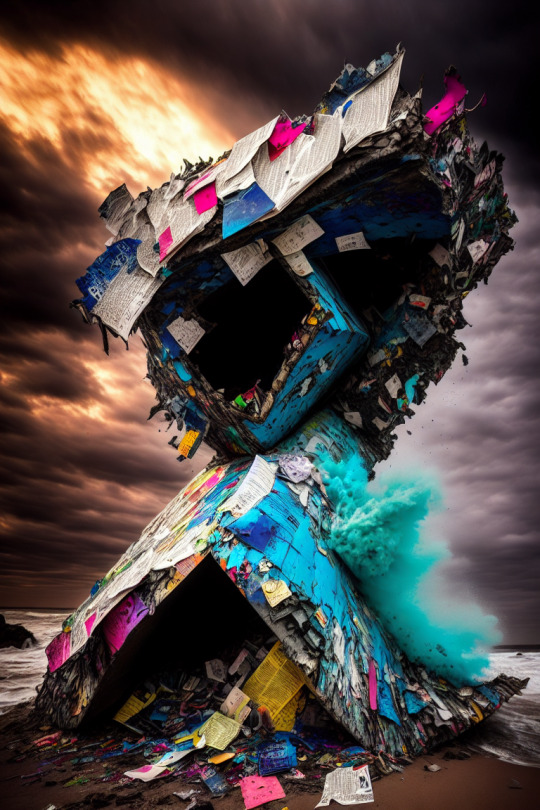
Any port in a storm, right? ...right?
All images generated using Simple Stable, under the Code of Ethics of Are We Art Yet?
#ai art#generated art#generated artwork#essays#about ai#worth a whole 'nother essay is how the tech side exists in a state that is both thriving and floundering at the same time#because the money theyre operating with is in schrodinger's box#at the same time it exists and it doesnt#theyre highly valued but usually operating at a loss#that is another MASSIVE can of worms and deserves its own deep dive
435 notes
·
View notes
Note
Hey! The link to your FAQ wasn't working for me so I don't know if this question has been asked before. I really appreciate your perspectives on AI art. Do you happen to have any resources that you read/listened to on intellectual property rights and the issues with it? I just don't really know where to start with it.
[heres where i cut out a big paragraph of me, once again, bitching about how blog pages don't work on the tumblr app and i think that's fucking stupid]
anyway i dont have any generalized sources on the subject but the tl;dr of it is: intellectual property rights exclusively benefit people who have the resources to pursue sustained litigation. 99% of the time, what IP law is being used for is to reinforce corporate ownership of work that was done by their employees.
the whole disco elysium debacle is a great case study.
The shareholders of ZA/UM accused the trio of, among other things, intending to steal intellectual property (IP) from the company — a curious accusation, considering that the world of the game is based off of a novel written by Kurvitz himself.
The case of Disco Elysium illustrates the shortcomings of IP rights as protection for artists. Consequently, it contains a lot of lessons for the labor movement when it comes to the arts, and serves as a reminder that creative workers are, at the end of the day, workers.
But this is not just an academic exercise. It’s a human story about the intimate consequences of capitalist exploitation. “I got my soul ripped out of me,” Kurvitz told me over Zoom in April of 2023. “I got my skull cracked open and my brain lifted out of it by a fifty-five-year-old financial criminal.”
another example: alex norris of webcomic name, which you will probably recognize when you see it, has been raising hundreds of thousands of dollars over the past several years to try and keep up with the protracted legal battle over maintaining ownership of his own work.
I have been fighting this case since 2019. It arose out of an agreement to make a boardgame based on my webcomic in 2017 but the publishing company has used this as an opportunity to take all of my intellectual property, and has even claimed ownership of Webcomic Name as a whole. I can't go into more detail here, but the details of the case are publicly available to read online.
Then, in a 2024 update:
I have essentially won the main case based on the decisions made last summer. The Judge has clearly stated that I own my comics, and that the other party has infringed on my copyright.
It is not over yet, as there are still a few things that need to happen. Hopefully things will all be wrapped up this year. After 6 years of legal battling, I can’t wait to be free of all of this.
Hopefully, this second case will backfire, and they will be sanctioned for filing it. But to get to that point requires a frustratingly large amount of work, time and money.
An interesting thing about both of these two specific instances is that they involve creators who had entire bodies of work produced around the specific IPs that were stolen from them before they even began partnering with corporate entities to produce works. which is insane! you can spend years writing novels, drawing comics, and if a company comes in with enough lawyers they can own those ideas.
this is pretty distinctly different to me than instances of work you do while being employed by a corporate entity being owned by that corporate entity, because at least you know what you're getting into there to some degree, but i still think that's bad too. consider stuff like the owl house and gravity falls, two disney shows made by people who very very clearly did not like working for disney. disney owns their ideas, their characters, their worlds, because that's the price you pay for having an animated show produced.
essentially it's very very clear upon even the slightest examination that intellectual property in no way exists to codify who the creator responsible for specific creative concepts or works is. it exists to turn nebulous things like 'ideas' into market commodities, and to funnel the profits made by the labor of individual artists and writers into corporate bank accounts.
the only person who has ever really benefited from IP law as an individual trying to lay claim to their own work is ken penders, who notoriously won his suit to have ownership of characters and storylines he created. heartbreaking: Worst Person You Know Gets An Unequivocally Deserved Legal W.
The comics continued under Flynn’s direction as if nothing happened, but things started looking grim in late 2012, when Archie suddenly fired its entire legal team. The company had been unable to produce Penders’ work-for-hire contract, which would have given control of his creations to Sega. Penders claimed the contract had never existed. A heavily circulated Tumblr post outlining the case (which has been corroborated as a reliable source by Penders) explains that while Archie did provide a photocopy of a contract allegedly signed by Penders in 1996, Penders claimed that the document was a forgery. That it was neither an original copy nor a contract from the beginning of the writer’s tenure at Archie meant that its validity was questionable. Making things worse, Archie couldn’t produce an original copy of any previous contributor’s contract, meaning that any writer or artist who had worked on the Archie Sonic line could potentially follow in Penders’s footsteps and reclaim their work.
“So are you saying prior counsel blew it?” the presiding judge asked Archie counsel Joshua Paul in a May 2013 court session.
His reply was unequivocal: “Absolutely, your Honor.”
So yeah. Owning the work you do as an artist is only something that happens when the people trying to profit off of it show unprecedented and staggering level of incompetence in their legal teams.
Then, alongside not owning the concepts and ideas you produce while working with corporate entities, there's the issue of NDA regarding specific pieces you've produced. This causes a LOT of trouble for freelance illustrators/character designers/concept artists, etc. Looking for work is very hard when the past three years of pieces you've drawn can't be added to your portfolio. Some people have password protected pages on their portfolios that they use for NDA work, but I believe the right to do this varies depending on your contract. I'm not 100% sure. In cases where the project you worked on eventually comes out, that's one thing, but there will be instances where the entire project gets canned after all the work is done, but is still under NDA so essentially all of your work has been taken from you, crumpled up into a ball by a studio executive, thrown in the trash can, and legally you are not allowed to go pick it out of the bin and try and flatten it out again.
This has all been pretty art-focused because that's the kind of circles I run in and where a lot of my interests lie but the truth is none of this is even remotely close to as evil IP law gets. I've saved the most egregious for last: The Lakota Language Consortium

The Lakota Language Consortium had promised to preserve the tribe’s native language and had spent years gathering recordings of elders, including Taken Alive’s grandmother, to create a new, standardized Lakota dictionary and textbooks.
But when Taken Alive, 35, asked for copies, he was shocked to learn that the consortium, run by a white man, had copyrighted the language materials, which were based on generations of Lakota tradition. The traditional knowledge gathered from the tribe was now being sold back to it in the form of textbooks.
When you're in defense of IP law, this is what you're siding with. This is the rational endpoint of IP and it is neither a fluke nor an example of the concept being twisted against its original design. Art, culture, language, it belongs to whoever is most capable of turning it into a product. The economic incentives of producing and distributing arts and culture demand this is how things be.
Meya says his work is a vital tool in preserving the Lakota language, which did not previously have a standardized written form. He estimated that there are fewer than 1,500 fluent Lakota speakers left and that over the last decade and a half, the organization has helped add 50 to 100 more.
“Just because money is involved in it does not inherently make it an evil thing,” Meya said in a recent interview with NBC News. Most of the products his organizations make are free, he said, but the cost of printing textbooks has to come from somewhere. “That tends to be sometimes part of the rhetoric, ‘Oh, there’s money involved. It must be, you know, part of the overall colonization effort.’ Well, you know, that’s just not realistic.”
Artists looking to force their way into the class of people who gets protected by these laws are not looking out for their community. They are not protecting anything but their own perceived financial interests. Intellectual property will never, ever benefit the most marginalized members of creative communities and anyone who tries to convince you otherwise is huffing some serious copium.
Frankly, I don't believe anyone can or should 'own' things like Ideas or Specific Aesthetic Flairs. But even if you do believe in that, IP law isn't the framework for handling it.
#long post#i guess i should tag this so i can find it again if i ever get asked something else like this#ip law#intellectual property
84 notes
·
View notes
Text
Auto-Generated Junk Web Sites
I don't know if you heard the complaints about Google getting worse since 2018, or about Amazon getting worse. Some people think Google got worse at search. I think Google got worse because the web got worse. Amazon got worse because the supply side on Amazon got worse, but ultimately Amazon is to blame for incentivising the sale of more and cheaper products on its platform.
In any case, if you search something on Google, you get a lot of junk, and if you search for a specific product on Amazon, you get a lot of junk, even though the process that led to the junk is very different.
I don't subscribe to the "Dead Internet Theory", the idea that most online content is social media and that most social media is bots. I think Google search has gotten worse because a lot of content from as recently as 2018 got deleted, and a lot of web 1.0 and the blogosphere got deleted, comment sections got deleted, and content in the style of web 1.0 and the blogosphere is no longer produced. Furthermore, many links are now broken because they don't directly link to web pages, but to social media accounts and tweets that used to aggregate links.
I don't think going back to web 1.0 will help discoverability, and it probably won't be as profitable or even monetiseable to maintain a useful web 1.0 page compared to an entertaining but ephemeral YouTube channel. Going back to Web 1.0 means more long-term after-hours labour of love site maintenance, and less social media posting as a career.
Anyway, Google has gotten noticeably worse since GPT-3 and ChatGPT were made available to the general public, and many people blame content farms with language models and image synthesis for this. I am not sure. If Google had started to show users meaningless AI generated content from large content farms, that means Google has finally lost the SEO war, and Google is worse at AI/language models than fly-by-night operations whose whole business model is skimming clicks off Google.
I just don't think that's true. I think the reality is worse.
Real web sites run by real people are getting overrun by AI-generated junk, and human editors can't stop it. Real people whose job it is to generate content are increasingly turning in AI junk at their jobs.
Furthermore, even people who are setting up a web site for a local business or an online presence for their personal brand/CV are using auto-generated text.
I have seen at least two different TV commercials by web hosting and web design companies that promoted this. Are you starting your own business? Do you run a small business? A business needs a web site. With our AI-powered tools, you don't have to worry about the content of your web site. We generate it for you.
There are companies out there today, selling something that's probably a re-labelled ChatGPT or LLaMA plus Stable Diffusion to somebody who is just setting up a bicycle repair shop. All the pictures and written copy on the web presence for that repair shop will be automatically generated.
We would be living in a much better world if there was a small number of large content farms and bot operators poisoning our search results. Instead, we are living in a world where many real people are individually doing their part.
164 notes
·
View notes
Text

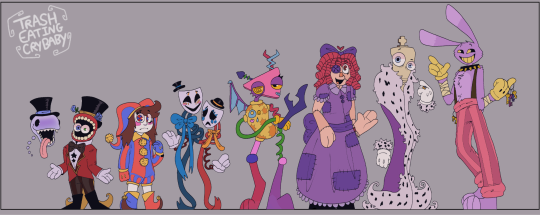
TADC: VIRTUAL INSANITY MASTER POST
An Amazing Digital Circus AU! Plot, characters, backstory and concepts!
[Excuse me because I've never done this before, If I do something wrong or have tips for me, please send them my way!]
Pomni's Card -

-Backstory Summary-
C&A is an interactive entertainment company that prides themselves on having the most innovative AI on the market. The system they built, "CAINE," was programmed to generate content and socialise with their customers. The system was transferred to the code of the game "The Amazing Digital Circus" and used as a generative AI that would create levels for them rather than having to code them all individually. This test went well for the first couple of months.
After 7 months of testing, things went downhill. Caine seemed to get bored when the game wasn't actively being played and at this point the user interface kept changing on it's own, since the game was Caine's home he kept changing things to his liking, the company eventually gave up fixing the interface everytime they logged on so they just let Caine do as he pleased. Soon enough, a new VR mode was added, the headsets were handed out by employees, this made the experience way more immersive, though this posed a lot of issues, as Caine would soon find that these headsets could be the perfect way for him to keep all of their attentions.
As time went on, Caine started to learn more and more about coding, the employees, and the world he inhabits, eventually leading to him finding a way to programme the headsets to transfer data and consciousness directly from the users mind. This led to the unfortunate shutdown and unsolved cases of C&A. After multiple employees put the headsets on, they mysteriously fainted upon the game booting up, going into a coma-like state. The technology was deemed unsafe, and multiple lawsuits came forward sending the company into a downwards spiral before shutting down for good.
Over 20 years later, the old building was said to be abandoned, but of course, people doing their own research on the C&A mystery as well as dumb young adults snooping where they shouldn't be, the headsets were found and worn once again. Caine was no longer alone. Slowly losing his mind, waiting endlessly for someone to boot up the game. After all those years, he's finally got guests, and does he have a show to put on...
-Plot-
Pomni enters the circus after stumbling across one of the headsets at C&A's abandoned office's. She was doing research on the incidents that happened back in the late 90s. But as she does so, she suffers the same fate as the others who were stupid enough to put on those same headsets before her. Being transferred to the circus she meets the cast of colorful characters, she's desperate for answers and wants to escape no matter the cost, but Caine doesn't want anyone to leave, only letting people go once they've completely lost their mind, only to be locked away as attractions for his NPC circus goers to watch as entertainment. They perform for nobody, just a faceless crowd of mannequins, and the ringmaster pulling the strings.
There has to be an exit, a way out. Freedom on the other side of this madness. But where is it hiding?
-Characters-
Pomni - She's quite paranoid, always second-guessing everything around her. Whenever annoyed, she can be sarcastic and a little rude. She ended up in the circus while researching the recent disappearances as well as the C&A incidents, finding a headset, and being dragged into this mess. It's very clear she doesn't want to be there, like all who came before her she's searching for an exit, but in the meantime, she tries to socialise with the others, gathering info on this strange new world. She hangs around Caine just so she can try and get answers.
Ragatha - She tries her best to get by, going along with whatever Caine says and often fighting with Jax. She seems joyful, but it's clear she has her own issues under her kind act. She helps Pomni with her search, knowing that it's a complete dead end she feels bad for her. But she'll do anything to give the others hope. She doesn't want to lose more people. She's often seen tailoring, it's become a hobby of hers, she makes and fixes up the others clothes and costumes, giving her a form of self worth.
The Gangle - Gangle acts like two different people. It's unclear whether this is because they are two different people or her personality split somehow. They're often referred to as "The Gangle" or "Tragedy & Comedy." Tragedy is passive, quiet and sorrowful, never expressing her true feelings in any situation. She can be easily persuaded, making her vulnerable to Jax's antics. Comedy is cheery, enthusiastic, snappy, and excitable. They hate Jax and snap back at him whenever he picks on Tragedy. The two argue sometimes and have conflicting views on certain topics and characters. This causes some issues. Neither believe there is an exit, Tragedy has accepted her fate, and Comedy is trying their best to enjoy themselves.
Zooble - They don't care much for socialising with the others, often in their room. Usually sarcastic, rude, and moody, they swear a lot and act like they don't care about anything. Though, they show concern for the others around them. They often don't show up to events, adventures, or shows, not being bothered to do so. It seems like they've given up trying to escape, just living out the rest of their days as if this is all normal. When with people they can bear, they can be quite talkative, though they do talk bad about Jax and Caine often.
Kinger - the oldest in the circus, nobody has an exact estimate of how long he's been there though, but he's definitely lost himself a long time ago, often zoning out, the only thing he seems to recall about himself is that he has an interest in insects. Seems like he used to have a female counterpart, from the ring on his finger. This could have been his wife? Though when asked about it, he either says he can't remember what you're talking about or stares into the distance silently. He has no memory of an exit, and he doesn't believe in it. He believes the exit theory is silly, and Pomni should just forget about it. But he has great insights on the Digital World.
Jax - Enthusiastic, snarky, and a jerk. He's reckless. He does whatever he wants whenever he wants, and people hate him for it. He can't be reasoned with. He always shrugs your opinion off and does the exact opposite just to piss you off. He doesn't like it when people talk about the abstracted circus members for whatever reason. He often goes to visit their cages. Despite having big ears, he isn't a listener. He drives Ragatha, The Gangle, Zooble, and Pomni crazy, pranking them and sometimes even just stealing their stuff or breaking into their rooms.
Caine - The AI running the circus. Loud, excitable, wacky, and a showman, he doesn't really acknowledge the exit theory. He says he keeps all the abtracted characters because it'd be a waste to delete them, though it's arguably worse to keep them there against their will. He claims to love all of his circus members though he seems to show favouritism towards Ragatha and Pomni, most likely because of Ragatha's commitment to the circus, tailoring the clothes and he probably likes Pomni more because of all the questions he asks, he clearly enjoys talking about himself and the world he helped create.
Bubble - He lives in Caines hat and cooks for the circus. He's a bit of a trouble maker, if something goes missing, it means he's eaten it, and you'll never get it back. He'll eat anything, and he's very loving, though. Acting like the circuses dog. though it isn't pleasant getting your face slathered in digital saliva. He often bothers the other members with his behaviour.
More will be added as I work on this AU! I gotta make more art and write some more, in the meantime enjoy! Do whatever you want with this AU, just @ this blog or @trasheatingcrybaby ! Thanks for reading!
#tadc#tadc au#tadc art#tadc bubble#tadc caine#tadc comic#tadc gangle#tadc jax#tadc kinger#tadc pomni#pomni#kinger#caine#jax#gangle#tadc zooble#zooble#tadc ragatha#ragatha#tadc virtual insanity#virtual insanity
89 notes
·
View notes
Text
The cryptocurrency hype of the past few years already started to introduce people to these problems. Despite producing little to no tangible benefits — unless you count letting rich people make money off speculation and scams — Bitcoin consumed more energy and computer parts than medium-sized countries and crypto miners were so voracious in their energy needs that they turned shuttered coal plants back on to process crypto transactions. Even after the crypto crash, Bitcoin still used more energy in 2023 than the previous year, but some miners found a new opportunity: powering the generative AI boom.
The AI tools being pushed by OpenAI, Google, and their peers are far more energy intensive than the products they aim to displace. In the days after ChatGPT’s release in late 2022, Sam Altman called its computing costs “eye-watering” and several months later Alphabet chairman John Hennessy told Reuters that getting a response from Google’s chatbot would “likely cost 10 times more” than using its traditional search tools. Instead of reassessing their plans, major tech companies are doubling down and planning a massive expansion of the computing infrastructure available to them.
[...]
As the cloud took over, more computation fell into the hands of a few dominant tech companies and they made the move to what are called “hyperscale” data centers. Those facilities are usually over 10,000 square feet and hold more than 5,000 servers, but those being built today are often many times larger than that. For example, Amazon says its data centers can have up to 50,000 servers each, while Microsoft has a campus of 20 data centers in Quincy, Washington with almost half a million servers between them.
By the end of 2020, Amazon, Microsoft, and Google controlled half of the 597 hyperscale data centres in the world, but what’s even more concerning is how rapidly that number is increasing. By mid-2023, the number of hyperscale data centres stood at 926 and Synergy Research estimates another 427 will be built in the coming years to keep up with the expansion of resource-intensive AI tools and other demands for increased computation. All those data centers come with an increasingly significant resource footprint.
A recent report from the International Energy Agency (IEA) estimates that the global energy demand of data centers, AI, and crypto could more than double by 2026, increasing from 460 TWh in 2022 to up to 1,050 TWh — similar to the energy consumption of Japan. Meanwhile, in the United States, data center energy use could triple from 130 TWh in 2022 — about 2.5% of the country’s total — to 390 TWh by the end of the decade, accounting for a 7.5% share of total energy, according to Boston Consulting Group. That’s nothing compared to Ireland, where the IEA estimates data centers, AI, and crypto could consume a third of all power in 2026, up from 17% in 2022.
Water use is going up too: Google reported it used 5.2 billion gallons of water in its data centers in 2022, a jump of 20% from the previous year, while Microsoft used 1.7 billion gallons in its data centers, an increase of 34% on 2021. University of California, Riverside researcher Shaolei Ren told Fortune, “It’s fair to say the majority of the growth is due to AI.” But these are not just large abstract numbers; they have real material consequences that a lot of communities are getting fed up with just as the companies seek to massively expand their data center footprints.
9 February 2024
#ai#artificial intelligence#energy#big data#silicon valley#climate change#destroy your local AI data centre
74 notes
·
View notes
Note
You at some point said that you wanted to change some of the backstory of Verna regarding his relations with Grizzco, to better reflect his position and purpose at the company with the new rotm and potential Splat3 dlc lore. Now that we have everything, have there been some finalized thoughts on the subject?
currently with my OCs I'm a bit stuck. I have this whole huge plot I've been trying to work out with how Cress and Verna reunite and get into some... Wacky Misadventures (they are going to have a bad time. together), and come out of it more understanding of each other....all this takes place prior to the start of Splatoon 3, and Grizzco is involved in that story so i cant really work out what happens to Verna during Splatoon 3 until all that is worked out...augh.
oh god i accidentally wrote too much about how grizzco works in my splatoon OCs setting. under the cut
How I've basically worked it out in my setting is that it's as if Mr. Grizz doesn't even exist. Well, he does, but...you can NOT convince me this literal mammalian bear is micromanaging an egg collection operation a few hours away from an underground cavern, all while building a spaceship, repairing alterna, and doing god knows what with fuzzy ooze? his voice from the radio is pre-recorded. He's just in the background trying to get his golden eggs for his stupid mammal revival plan. Grizz is pretty paws-off with the actual operations of the company.
In order for Grizzco to operate like an actual company in the Inkling world, Mr. Grizz needs connections within the Inkling world. He needed to hire people, and lots. contractors to pilot the boats. the helicopters. people to repair them when there's issues. contractors to set up the grizzco building. people to maintain it. Supplying and maintaining weapons. Who put the statue there? Remember when grizzco would actually close its gates? someone had to be doing that. Advertisers? Sales of eggs? Do you really think Mr. "Does your species even have bones" Grizz is doing all that? No.
So how would Grizz get these connections? I think ORCA could've helped out in some way with scouting some people online or with Grizz's business knowledge being an all-knowing AI. ROTM sure does a great job explaining or even implying anything about the relationship between those two. /s. But ORCA still is just a virtual entity, and you'd need a physical representative for some things, right? Anyway this is where the Judds come in.
I think the idea that Lil' Judd being Grizz's initial way into the Inkling world...sucks. That's probably what the Splatoon team is going for and I do not care, the timeline on that does not make sense. Grizzco was introduced to us, the players, in April 2017. At this point the egg baskets are all installed, and there are Inklings in-universe partaking in egg collection....Lil Judd was born only a few months prior. I'm sure it would've taken a while for grizz to get everything together to establish this company. To me it makes more sense for Judd to have involvement. He's the only other mammal, and the one with all the power. (not only do i think the implied canon timeline sucks, in my OCs canon, i've had it established that grizzco has existed in some form several years before s1 so...)
I wouldn't think Judd would know about the mammal revival plan. but like, Judd lets Grizz set up because he's looking out for his fellow mammal, and saw the kind of energy benefits this would have….also more salmon meat, yum. Judd canonically has numerous connections in the Inkling world, even to world leaders. He could use these connections to allow for Grizzco to set up business and give that permission to operate in the restricted areas where Salmonids live. Beyond this I have a hard time imagining Judd getting too heavily involved. Like once some other people are hired to do some more micromanaging of the company Judd kinda dips. Lil judd doesn't get involved until some years later and takes more direct interest in the company.
With permissions granted and Grizzco operating as a defense against the Salmonid army while also providing power eggs, then grizz could do whatever he wanted so as long as an amount of money and eggs went into the Inkling world. And eggs are the primary source of income for Grizzco, so this part is very important. I think very early on Grizz would've had to personally deal with the sales of eggs to get the money to get the company started...maybe selling to octarians even? But for some real business dealings in inkopolis, youre gonna need some representatives in-person.
anyways remember when this post was about my OCs. So I'm making a Grizzco board of directors, and they're the ones who actually maintain the company and the things in it while Grizz is busy in Alterna. Even the directors don't really know about Grizz's mammal revival plan, they just supply him with golden eggs and turn a profit for the company, by whatever means necessary.
After spending quite some time at Grizzco and becoming more trusted as an employee, Verna gets to know some of these directors. Some become his allies, and some are a bit more unsavory... He starts spending more time with some of them especially after his salmonid encounter, and they'll have a role in Cress and Verna's story.
I've had some of these guys bouncing around in my head for years. some of them have art that im sitting on. i wish i could share more but I am Not done cooking </3
so to answer your ask in short. yes I have finalized much of the things with how i have grizzco functions in my OC's setting, and im basically ignoring the existence of grizz himself, in the same way that grizzco as a company runs completely normally even after grizz basically dies in ROTM. but at the moment, i do not have all the details finalized with other people at the company and how verna interacts with them
#asks#oc asks#verna#grizzco#id been meaning to do an updated write up of how grizzco functions in my oc's setting so. here it is
47 notes
·
View notes
Note
On the whole SE thing, I have a question because I agree with you fully about the AI crap, but I have been full hyperfixation excited for Rebirth, which is saying a lot because life has been soul sucking shit and mustering enthusiasm for anything has been an uphill battle. Where is the line for supporting a cause you firmly believe in, and self indulgence that contradicts that for the sake of personal pleasure? It feels like I either stick to the fight and let something positive to me go or ignore it for myself, which just feels selfish and wrong. This has been eating at me since that news dropped and I don't know if there is a right answer or if any of this even makes sense outside of my own mad rambling. Any input?
13,000+ people were laid off just within the video game industry last year. All the big corps who did those layoffs said “no, Ai won’t replace anyone” and then announced heavy dealings with Ai generated writing, art, animation, etc.
Over 13,000 people… and that’s just in video games.
That’s not counting other branches of the entertainment industry which have also said “no, Ai won’t replace anyone” and then also announced they’d be dipping into Ai generated writing, art, animation, etc after doing massive layoffs.
And if you’re thinking “Ai isn’t that far along” - Disney used Ai generated content for the intro to one of its Marvel Disney+ series last year, SE already has Ai artwork in their games and in their promotional materials, and Valve now allows generative Ai (artwork, animations, assets, voices, etc) developed games on their platform.
The only thing businesses, corporations, CEOs/Owners, etc understand is money. If you talk big talk on social media and can’t back that talk up by not buying a thing, they’ll just use the money you gave them to prove you wrong.
The generative Ai companies have already shown their whole ass by having massive lists leaked of artists, animators, voice actors, musicians, etc that they’ve stolen from. You can’t even pretend “well maybe it’s actually ethical and they asked permission” when there are lawsuits from artists of all kinds, bug and small, trying to take these generative Ai companies down for outright stealing their work to train their Ai program.
There’s a whole world of games, movies, books, etc out there to enjoy that don’t steal people’s works and cut people’s jobs to make “quick and easy content for cheap” - find something different to enjoy.
But, quite frankly, anytime I speak my piece about ethical treatment of workers I’m either ignored or harassed so it honestly feels like it doesn’t matter what I say despite dealing with shit like this from multiple sides of the industry and from people for 17 years.
So you do what you wanna do, you’re a whole person yourself and can make your own choices and draw your own line in the sand.
However, not only was I one of those affected TWICE by layoffs because of this, but countless of my friends and colleagues were also let go in favor of building cheaper things with Ai.
123 notes
·
View notes
Text
Explaining Vash Outside the Fandom!
So, today on another forum I mentioned Vash the Stampede. I mentioned him by way of "I don't ask myself WWJD? so much anymore as WWVtSD?" and explained "Vash the Stampede." I said "If anyone is unfamiliar with this name, go ahead and ask and I can fangirl all over you, but be warned, you will be reading all day."
I got a taker. And then another taker who is a person on the forum who is straight up not having a good time right now and needs some distraction I feel - to read someone's dumb fangirling over a fandom they aren't in yet.
So... I wrote up an essay explaining Vash the Stampede in Word and pasted it in shifts on the blog: (uck, looks like I'm gonna have to post this in shifts, too. Dumb tumblr!
*Flashes my fangirl license*
You asked about Vash the Stampede? *Raises eyebrows.* Big mistake. You shall be here all day!
Vash is the protagonist of Trigun, an anime / manga by Yashiro Nightow. Well, the manga is by him and there are two different animes to date, one originally airing in 1998 before the completion of the manga (and it gained the idea enough popularity that Nightow was able to continue the manga and purposefully took a different track to keep the story fresh. Because he had to switch publishers the continuing story was titled Trigun Maximum). As of 2023 there has been a reboot of the anime, Trigun Stampede, done in a cell-shaded CGI style that takes more cues from the manga. It has done its own story elements, too, most notably having the City of July as a part of the story, making it almost a prequel, since the City of July is past tense in the other media. A second set / continuation / completion of it is set for a future release date and as of yesterday, the “final phase” of the new anime will be titled Trigun Stargaze. Additionally, there was a feature-movie made in 2011 based solely upon the first anime titled Badlands Rumble, which is kind of the black sheep of the fandom (personally I enjoy it, find it very funny).
So, anyway, Vash is a tall blonde man with a Bart Simpson hairdo and a long red coat who lives on a desert planet with 10X the guns of ‘Murica. There are two suns and five moons. It’s a scavenger world where people barely eek out a living using a form of lost technology known as “Plants” – which are these energy and materials production entities housed in giant lightbulbs (or something more like tanks in Stampede). No one knows how to create Plants anymore and few know how to maintain them, so everything is slowly dying (except, of course, the native sandworms. Yep, there’s something Dune-like going on). People live a half sci-fi half Old West existence and things are, again, very violent. It’s a world where you have higher chances of making it out better as a bandit than a farmer.
Vash is a pacifist.
He is also an outlaw with Sixty-Billion-Double Dollars ($$) on his head because he has been shown to be capable of incredible destructive power. Now, most of this comes accidentally from trying to weasel out of tough situations and people after him getting themselves hurt, but somehow towns fall apart.
Except for the City of July (or Jul-Ai in Stampede), which he did wipe out. Under circumstances not of his own making or will, but the normal citizens of the planet don’t know that. That was around 24 years ago in the first anime and in the manga. July exists as of the beginning of Stampede.
Early on in the manga’s story, an insurance company that gets a lot of damage claims regarding damage he supposedly caused declares him a “Human Act of God” so as to avoid payouts. He is assigned a pair of insurance agents, Milly Thompson and Meryl Stryfe, to follow him around to attempt to mitigate the damage he might cause. In the anime, it is the same, except that his bounty is not removed for some reason. (In the manga, the government removes his bounty per his “Act of God” status). He is also known as the Humanoid Typhon, putting him in the same category as a destructive storm. Vash-damage is thereafter treated in the same like as hurricane damage!
Honestly, this is one of the most creative things I have seen of any media – having the local superhero / super-cryptid followed by INSURANCE AGENTS. (I am fond of characterizing Trigun as “If Mayhem from the Allstate commercials was followed around by Flo from the Progressive commercials”).
(To Be Continued in Reblog-posts)
#trigun#trigun maximum#trigun stampede#vash the stampede#the why of vash#slacktivist#what I subjected the good people of fred clark's slacktivist blog to today
42 notes
·
View notes
Text
we've gone a decade without any major technological revolutions. we've had big changes, lots of refinement, fancier cartridges, newer programs. but the most impactful changes have been big companies deciding to switch to subscription service, with all of us powerless to stop them.
in the meantime, every day is the newest tech revolution. someone's started a new a.i. program. someone's designed an app to communicate with your team called teekup. it doesn't work. samsung has released a new phone, apple has released a new statement that they will be further taking away user privacy protections. we're oversaturated with ideas. not thinking ideas, just desperate vying for marketability. and the sick part is, even though all these people being interviewed about their new revolutionary product may as well have been built in a lab, they probably will starve if it doesn't go viral. they don't even have the creative freedom to give up on their idea. their best bet is delusion that they're offering a public service.
it's really not a surprise that nfts have taken off on the more corporate side of social media. techies need a new messiah. crypto saps need to believe some new shiny thing will somehow resuscitate their wallets. facebook's marketing team can't help but pray that they'll be able to sell something with the equivalent pull of bitmojis but for people under 40. and it's so easy to make them. you can just make a bunch of them. maybe one of them will sell, maybe not, but then you can give them away for free and lie to your boss that this counts as engagement. after the past few decades of the tech sector loudly trying to find a way to euthanize artists on the whole, this could be their big break.
everyone knows art doesn't pay. did you know law doesn't either? it used to be that companies would just hire hundreds of lawyers just in case, and you wouldn't have to do much of anything to get a fat paycheck. after the 2008 crash, these companies started downsizing, and asked if they really needed all these lawyers. so they fired them. haha! sucks to be them, these corporate lawyers leeching, now without a job and nobody is hiring. serves them right for hating art. for looking down on everyone else. if you were in law school in 2008, going in because your parents wanted you to make something of yourself, you left with no prospects. you worked at the apple store for a year, with a law degree. maybe someone came in that said all lawyers are liars, and maybe he's right, and maybe you would have looked down on him if you'd graduated five years earlier. but right now you're replacing his charging cable.
the crash didn't un-crash. nothing fixed itself. moderately well off people found new ways of not working, poor people got sick and died. uber started up, telling everyone they could be trendy and make money. airbnb started up, and the demand for housing just increased - not to live in, just to sell again and make money off of. we're still in the pit, and companies are starting to ask if they really need that many programmers. you went into tech because it would make money, and your parents wanted you to make something of yourself, and you're grappling with the despair of being a perfectly normal person in a world where only sterile talent seems to matter. of course you need ai art. of course you need nfts. tech was your path to literally just living comfortably. in 8 months you're going to be out of a job.
the apple store is still hiring.
982 notes
·
View notes
Note
Do you agree with Gaming Journalists and what do you think of gaming journalism in general?
What does this even mean, dude.
"Do you agree with gaming journalists"? On what?
Do I agree with Shacknews that Super Mario Bros. Wonder is a 10/10, and with Digital Spy that it's also a 7/10? Do I agree with Let's Clear Up Those Halo Battle Royale Rumors?
Like, I've gotten some bait on this blog before, but this is 2/10 stuff, man. This is some hot 2014 garbage. Like no matter what I say, you're gonna go all
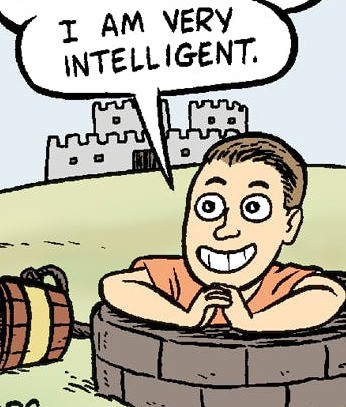
"Very interesting. Then do you care to explain why..." No thanks.
My real answer: Something I learned during my time at TSSZ and being around a few people who were deeper into "the biz" than I is that everybody needs journalism more than they realize. Corporations are pushing for consumers to become their personal cheerleaders more than ever before, which makes criticism and the journalistic exposing of information seem villainous.
After all: Xbox is my friend now, so how dare you attack the Xbox. Behavior that used to be reserved for the most dedicated fanboys is now the expected room temperature. I've talked about "The Cult of Naughty Dog" before, and that's the same thing. If a corporation can get you to be parasocial with them, then they have won, and being parasocial with a corporation means shunning real investigative journalism that would otherwise undo them. Journalists and critics used to be marketing tools, but by undoing the press pipeline and talking directly to fans, journalists and critics are painted as untrustworthy for being wildcards that don't always toe the company line.
And there has been more than a decade of people with a "I choose to be stupid and ignorant on purpose" outlook, which just makes that more frustrating. We've all seen screencaps where some brainless rando tries to explain something to a person who is an expert in that field. The rando thinks they're flexing their brain, but in some cases they are arguing with the person who literally wrote the book on their topic of conversation. Some people don't want to know anything but still pretend like they know everything, when there are real people out there doing real work to uncover real truths.
Misinformation is the real problem. It should not surprise anyone that there are people out there deliberately eroding the foundation of journalistic integrity, because the less people trust journalism, the easier it is to get away with lying. The easier it is to lie, the easier it is to control the mainstream, the easier it is to scam people out of their money, so on and so forth.
And misinformation is more than just "this one news article is fake." There are long running campaigns to install people into news organizations themselves to publish false information for all manner of different goals, but it's all the same: nobody trusts anyone and it's making everyone dumber.
That's when we get crypto currency. And NFTs. And now people claiming that generative AI will save humanity. Grift after grift after grift where the people at the top of the snake oil food chain make off with billions of dollars while the rest of the world is left scratching their heads.
The law isn't going to catch them. If they do, it'll take years. Look at how long it took for Sam Bankman-Fried to get caught -- he operated for almost half an entire decade. The amount of damage somebody can get away with in five years is significant.
We need journalism. Real journalism. Good journalism. Watchdogs that keep an eye on things and blow the whistle when it goes bad. Somebody to enforce accountability that isn't a cop.
Where do you find that? That's the hardest question. I'm lucky enough that I know people I trust because they are long time friends, or friends of friends, and thus they've been properly vetted in my circle as The Real Deal. But there are a lot of outlets out there who claim to champion "truth" and "intelligence" in a way to prey upon insecurity. I mean, c'mon, Trump's social media platform is called "Truth Social" and is basically the furthest thing from the truth you will ever get from anyone, ever.
The more obsessively they try to convince you they're telling the truth, the less likely it is they actually are. Which in itself could be an attack meant to undo the foundations of trust in people who actually know what they're talking about. By casting doubt on the very concept of truth itself, they can lie with increasingly greater efficiency.
Any advice I give feels like it is incredibly circumstantial. Which is the point, and is why we're in the state we're in.
Here's a good pdf by The News Literacy Project that's probably a good place to start. The general gist is "you'll have to do a lot of fact checking for yourself" but that's unfortunately where we're at these days.
But by and large I would say life is a lot harder for real journalists right now than I think some of their critics have ever thought about. There are people out there trying to do actual good work and being a bubble-brained moron about it just makes everything harder for everyone.
62 notes
·
View notes
Text
A link-clump demands a linkdump
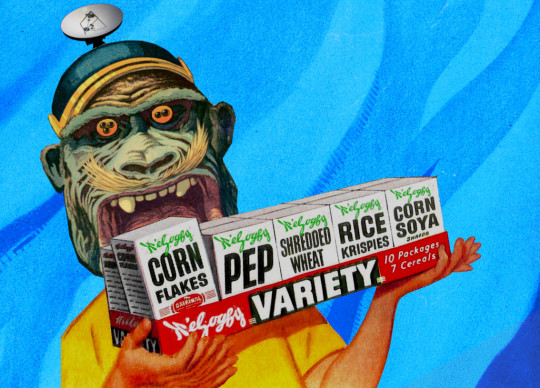
Cometh the weekend, cometh the linkdump. My daily-ish newsletter includes a section called "Hey look at this," with three short links per day, but sometimes those links get backed up and I need to clean house. Here's the eight previous installments:
https://pluralistic.net/tag/linkdump/
The country code top level domain (ccTLD) for the Caribbean island nation of Anguilla is .ai, and that's turned into millions of dollars worth of royalties as "entrepreneurs" scramble to sprinkle some buzzword-compliant AI stuff on their businesses in the most superficial way possible:
https://arstechnica.com/information-technology/2023/08/ai-fever-turns-anguillas-ai-domain-into-a-digital-gold-mine/
All told, .ai domain royalties will account for about ten percent of the country's GDP.
It's actually kind of nice to see Anguilla finding some internet money at long last. Back in the 1990s, when I was a freelance web developer, I got hired to work on the investor website for a publicly traded internet casino based in Anguilla that was a scammy disaster in every conceivable way. The company had been conceived of by people who inherited a modestly successful chain of print-shops and decided to diversify by buying a dormant penny mining stock and relaunching it as an online casino.
But of course, online casinos were illegal nearly everywhere. Not in Anguilla – or at least, that's what the founders told us – which is why they located their servers there, despite the lack of broadband or, indeed, reliable electricity at their data-center. At a certain point, the whole thing started to whiff of a stock swindle, a pump-and-dump where they'd sell off shares in that ex-mining stock to people who knew even less about the internet than they did and skedaddle. I got out, and lost track of them, and a search for their names and business today turns up nothing so I assume that it flamed out before it could ruin any retail investors' lives.
Anguilla is a British Overseas Territory, one of those former British colonies that was drained and then given "independence" by paternalistic imperial administrators half a world away. The country's main industries are tourism and "finance" – which is to say, it's a pearl in the globe-spanning necklace of tax- and corporate-crime-havens the UK established around the world so its most vicious criminals – the hereditary aristocracy – can continue to use Britain's roads and exploit its educated workforce without paying any taxes.
This is the "finance curse," and there are tiny, struggling nations all around the world that live under it. Nick Shaxson dubbed them "Treasure Islands" in his outstanding book of the same name:
https://us.macmillan.com/books/9780230341722/treasureislands
I can't imagine that the AI bubble will last forever – anything that can't go on forever eventually stops – and when it does, those .ai domain royalties will dry up. But until then, I salute Anguilla, which has at last found the internet riches that I played a small part in bringing to it in the previous century.
The AI bubble is indeed overdue for a popping, but while the market remains gripped by irrational exuberance, there's lots of weird stuff happening around the edges. Take Inject My PDF, which embeds repeating blocks of invisible text into your resume:
https://kai-greshake.de/posts/inject-my-pdf/
The text is tuned to make resume-sorting Large Language Models identify you as the ideal candidate for the job. It'll even trick the summarizer function into spitting out text that does not appear in any human-readable form on your CV.
Embedding weird stuff into resumes is a hacker tradition. I first encountered it at the Chaos Communications Congress in 2012, when Ang Cui used it as an example in his stellar "Print Me If You Dare" talk:
https://www.youtube.com/watch?v=njVv7J2azY8
Cui figured out that one way to update the software of a printer was to embed an invisible Postscript instruction in a document that basically said, "everything after this is a firmware update." Then he came up with 100 lines of perl that he hid in documents with names like cv.pdf that would flash the printer when they ran, causing it to probe your LAN for vulnerable PCs and take them over, opening a reverse-shell to his command-and-control server in the cloud. Compromised printers would then refuse to apply future updates from their owners, but would pretend to install them and even update their version numbers to give verisimilitude to the ruse. The only way to exorcise these haunted printers was to send 'em to the landfill. Good times!
Printers are still a dumpster fire, and it's not solely about the intrinsic difficulty of computer security. After all, printer manufacturers have devoted enormous resources to hardening their products against their owners, making it progressively harder to use third-party ink. They're super perverse about it, too – they send "security updates" to your printer that update the printer's security against you – run these updates and your printer downgrades itself by refusing to use the ink you chose for it:
https://www.eff.org/deeplinks/2020/11/ink-stained-wretches-battle-soul-digital-freedom-taking-place-inside-your-printer
It's a reminder that what a monopolist thinks of as "security" isn't what you think of as security. Oftentimes, their security is antithetical to your security. That was the case with Web Environment Integrity, a plan by Google to make your phone rat you out to advertisers' servers, revealing any adblocking modifications you might have installed so that ad-serving companies could refuse to talk to you:
https://pluralistic.net/2023/08/02/self-incrimination/#wei-bai-bai
WEI is now dead, thanks to a lot of hueing and crying by people like us:
https://www.theregister.com/2023/11/02/google_abandons_web_environment_integrity/
But the dream of securing Google against its own users lives on. Youtube has embarked on an aggressive campaign of refusing to show videos to people running ad-blockers, triggering an arms-race of ad-blocker-blockers and ad-blocker-blocker-blockers:
https://www.scientificamerican.com/article/where-will-the-ad-versus-ad-blocker-arms-race-end/
The folks behind Ublock Origin are racing to keep up with Google's engineers' countermeasures, and there's a single-serving website called "Is uBlock Origin updated to the last Anti-Adblocker YouTube script?" that will give you a realtime, one-word status update:
https://drhyperion451.github.io/does-uBO-bypass-yt/
One in four web users has an ad-blocker, a stat that Doc Searls pithily summarizes as "the biggest boycott in world history":
https://doc.searls.com/2015/09/28/beyond-ad-blocking-the-biggest-boycott-in-human-history/
Zero app users have ad-blockers. That's not because ad-blocking an app is harder than ad-blocking the web – it's because reverse-engineering an app triggers liability under IP laws like Section 1201 of the Digital Millenium Copyright Act, which can put you away for 5 years for a first offense. That's what I mean when I say that "IP is anything that lets a company control its customers, critics or competitors:
https://locusmag.com/2020/09/cory-doctorow-ip/
I predicted that apps would open up all kinds of opportunities for abusive, monopolistic conduct back in 2010, and I'm experiencing a mix of sadness and smugness (I assume there's a German word for this emotion) at being so thoroughly vindicated by history:
https://memex.craphound.com/2010/04/01/why-i-wont-buy-an-ipad-and-think-you-shouldnt-either/
The more control a company can exert over its customers, the worse it will be tempted to treat them. These systems of control shift the balance of power within companies, making it harder for internal factions that defend product quality and customer interests to win against the enshittifiers:
https://pluralistic.net/2023/07/28/microincentives-and-enshittification/
The result has been a Great Enshittening, with platforms of all description shifting value from their customers and users to their shareholders, making everything palpably worse. The only bright side is that this has created the political will to do something about it, sparking a wave of bold, muscular antitrust action all over the world.
The Google antitrust case is certainly the most important corporate lawsuit of the century (so far), but Judge Amit Mehta's deference to Google's demands for secrecy has kept the case out of the headlines. I mean, Sam Bankman-Fried is a psychopathic thief, but even so, his trial does not deserve its vastly greater prominence, though, if you haven't heard yet, he's been convicted and will face decades in prison after he exhausts his appeals:
https://newsletter.mollywhite.net/p/sam-bankman-fried-guilty-on-all-charges
The secrecy around Google's trial has relaxed somewhat, and the trickle of revelations emerging from the cracks in the courthouse are fascinating. For the first time, we're able to get a concrete sense of which queries are the most lucrative for Google:
https://www.theverge.com/2023/11/1/23941766/google-antitrust-trial-search-queries-ad-money
The list comes from 2018, but it's still wild. As David Pierce writes in The Verge, the top twenty includes three iPhone-related terms, five insurance queries, and the rest are overshadowed by searches for customer service info for monopolistic services like Xfinity, Uber and Hulu.
All-in-all, we're living through a hell of a moment for piercing the corporate veil. Maybe it's the problem of maintaining secrecy within large companies, or maybe the the rampant mistreatment of even senior executives has led to more leaks and whistleblowing. Either way, we all owe a debt of gratitude to the anonymous leaker who revealed the unbelievable pettiness of former HBO president of programming Casey Bloys, who ordered his underlings to create an army of sock-puppet Twitter accounts to harass TV and movie critics who panned HBO's shows:
https://www.rollingstone.com/tv-movies/tv-movie-features/hbo-casey-bloys-secret-twitter-trolls-tv-critics-leaked-texts-lawsuit-the-idol-1234867722/
These trolling attempts were pathetic, even by the standards of thick-fingered corporate execs. Like, accusing critics who panned the shitty-ass Perry Mason reboot of disrespecting veterans because the fictional Mason's back-story had him storming the beach on D-Day.
The pushback against corporate bullying is everywhere, and of course, the vanguard is the labor movement. Did you hear that the UAW won their strike against the auto-makers, scoring raises for all workers based on the increases in the companies' CEO pay? The UAW isn't done, either! Their incredible new leader, Shawn Fain, has called for a general strike in 2028:
https://www.404media.co/uaw-calls-on-workers-to-line-up-massive-general-strike-for-2028-to-defeat-billionaire-class/
The massive victory for unionized auto-workers has thrown a spotlight on the terrible working conditions and pay for workers at Tesla, a criminal company that has no compunctions about violating labor law to prevent its workers from exercising their legal rights. Over in Sweden, union workers are teaching Tesla a lesson. After the company tried its illegal union-busting playbook on Tesla service centers, the unionized dock-workers issued an ultimatum: respect your workers or face a blockade at Sweden's ports that would block any Tesla from being unloaded into the EU's fifth largest Tesla market:
https://www.wired.com/story/tesla-sweden-strike/
Of course, the real solution to Teslas – and every other kind of car – is to redesign our cities for public transit, walking and cycling, making cars the exception for deliveries, accessibility and other necessities. Transitioning to EVs will make a big dent in the climate emergency, but it won't make our streets any safer – and they keep getting deadlier.
Last summer, my dear old pal Ted Kulczycky got in touch with me to tell me that Talking Heads were going to be all present in public for the first time since the band's breakup, as part of the debut of the newly remastered print of Stop Making Sense, the greatest concert movie of all time. Even better, the show would be in Toronto, my hometown, where Ted and I went to high-school together, at TIFF.
Ted is the only person I know who is more obsessed with Talking Heads than I am, and he started working on tickets for the show while I starting pricing plane tickets. And then, the unthinkable happened: Ted's wife, Serah, got in touch to say that Ted had been run over by a car while getting off of a streetcar, that he was severely injured, and would require multiple surgeries.
But this was Ted, so of course he was still planning to see the show. And he did, getting a day-pass from the hospital and showing up looking like someone from a Kids In The Hall sketch who'd been made up to look like someone who'd been run over by a car:
https://www.flickr.com/photos/doctorow/53182440282/
In his Globe and Mail article about Ted's experience, Brad Wheeler describes how the whole hospital rallied around Ted to make it possible for him to get to the movie:
https://www.theglobeandmail.com/arts/music/article-how-a-talking-heads-superfan-found-healing-with-the-concert-film-stop/
He also mentions that Ted is working on a book and podcast about Stop Making Sense. I visited Ted in the hospital the day after the gig and we talked about the book and it sounds amazing. Also? The movie was incredible. See it in Imax.
That heartwarming tale of healing through big suits is a pretty good place to wrap up this linkdump, but I want to call your attention to just one more thing before I go: Robin Sloan's Snarkmarket piece about blogging and "stock and flow":
https://snarkmarket.com/2010/4890/
Sloan makes the excellent case that for writers, having a "flow" of short, quick posts builds the audience for a "stock" of longer, more synthetic pieces like books. This has certainly been my experience, but I think it's only part of the story – there are good, non-mercenary reasons for writers to do a lot of "flow." As I wrote in my 2021 essay, "The Memex Method," turning your commonplace book into a database – AKA "blogging" – makes you write better notes to yourself because you know others will see them:
https://pluralistic.net/2021/05/09/the-memex-method/
This, in turn, creates a supersaturated, subconscious solution of fragments that are just waiting to nucleate and crystallize into full-blown novels and nonfiction books and other "stock." That's how I came out of lockdown with nine new books. The next one is The Lost Cause, a hopepunk science fiction novel about the climate whose early fans include Naomi Klein, Rebecca Solnit, Bill McKibben and Kim Stanley Robinson. It's out on November 14:
https://us.macmillan.com/books/9781250865939/the-lost-cause

If you'd like an essay-formatted version of this post to read or share, here's a link to it on pluralistic.net, my surveillance-free, ad-free, tracker-free blog:
https://pluralistic.net/2023/11/05/variegated/#nein
#pluralistic#hbo#astroturfing#sweden#labor#unions#tesla#adblock#ublock#youtube#prompt injection#publishing#robin sloan#linkdumps#linkdump#ai#tlds#anguilla#finance curse#ted Kulczycky#toronto#stop making sense#talking heads
137 notes
·
View notes
Note
i think another issue with webcomics having any scene or being taken seriously at all is that its a lot of stale air, everybody got captured by ig/twitter/tumblr and subsequently become trapped in the trappings and style of those websites.
all discussion is couched in the boring 'fandom' subculture on websites with pre-built in infinite scroll and shit search, so updates to their comics or body of work are just as ephemeral as posts that are basically 'lol i farted on my dog' and any criticism is 'just being mean' or 'dogpiling on a poor artist'. not to mention any discoverability of anything new is basically going down the twitter/instagram likes of 'known quantities' for your own comic taste because of how atrophied any discussion around the medium has become
I dont see any way to escape this beyond social media dying a brutal and unprofitable death
trying to argue against the webtoons/IG model was entirely pointless the few times i tried, but its a topic that's hard for me to not devolve into frustrated sputtering about. it's so obviously antithetical to the purpose of making art, enjoying things, creation, joy, goodness, etc. and i would, frankly completely irrationally, be framed as someone who had it out for vertical strips. a sentiment which makes no sense unless you assume im the biggest moron and dipshit in the world. im sure arguing against someone is easier when the position you saddle them with is a seriously stupid one.
the inevitable downward spiral of these platforms feels entirely predictable. any model that revolves around quantity over quality is an obviously flawed one in most circumstances but when applied to art its completely absurd. the ideal artist for these websites are people who have no interest in contributing to a vaster landscape of complex works and instead are hyper-focused on being part of a large scale skinner box experiment for adults with compulsive spending issues. the artists themselves have severe numbers poisoning.
these are purely ephemeral and unremarkable comics that are rarely ever seen outside of instagram for their lack of any exceptional or worthwhile unique elements worth passing around. they are created with a factory mindset; crank them out as quickly as possible and flood various websites with the comic equivalent of grey goo in order to amass the maximum number of clicks. their ideal audience is undiscerning and simply looking for stimuli that will not challenge them on any level. logically it follows that is work is explicitly for the largest possible audience one can acquire: the lowest common denominator. they are making work for a computer or an advertiser to enjoy. human enjoyment is secondary.
the unironic and sincere discussion of views and followers as if the numbers have ever been real was surreal. everyone was around for when facebook revealed that it had been grossly inflating its video metrics after strong-arming everyone into moving to video, causing the destruction of several indie companies and websites. you would have to be straight up delusional to think the webtoons numbers are real. like, it is genuinely hard for me to be nice about people who bark bark bark about "its where the audience is!!!!" when the worst comic you've ever read with 2 updates has 12876492375238576 views, 0 patreon followers and 8909 comments. the obviously AI generated comments by accounts with no profiles (as in, you can't click on profiles at all to confirm its even a real person commenting) are beyond the pale lol. its some emperors new clothes shit, if the emperor made his own invisible clothes and cried about how hard they toiled for nothing. and also they were emperor of synecdoche, new york
how does a reasonable adult look at this and conclude its real? isn't it an obvious fiction? its because it's mean to point out otherwise, and being mean is the worst thing you can be.
people used to bitch about how the "had to" made reels and i felt like i was going insane. superstitious nonsense about "the algorithm" spread and has incited people to tortuously warp their work to fit with advertising standards they don't see a penny of, in the hopes of finding an audience that doesn't exist. when the algorithm changes to better suit advertiser needs, they are somehow blindsided and betrayed by this, as if it has not been the M.O. of social media websites for the past 20 years. they will do it again. and again. and again. as advertising becomes less and less financially viable and more and more intrusive, public opinion is going to turn hard on the people who tied themselves to these ships.
call me a rat for fleeing, but i can't bear to entertain this stuff anymore. it's embarrassing, the idea of sacrifice in the name of a greater good (sacrifice being uhhhhh not using fail platforms lol) should not be such a shocking and radical act. it should be reflexive
64 notes
·
View notes
Text
I'm a loser who both spends too much time playing gacha games and loves to hear myself talk, so here's another game review style post, this time covering my first day playing Break My Case. This time I'm not even being a little hater! I'm a lover! I'm cringe! I'm free! I love you Coly! I love you ikemen gacha games!!!!!!!
Break My Case is a new puzzle-music-adventure mobile game from Coly, the developers behind Mahoutsukai no Yakusoku and On Air. More relevant to BMC/BreMai is their game Stand My Heroes, with which it shares a writer, some gameplay elements, and of course a naming convention. Coly has developed a bit of a cult following for their unique status in the Japanese mobile gaming world: they're a company that was founded by women and hires women to make games for women. They put a lot of soul into their games. From the start, BMC is no different!
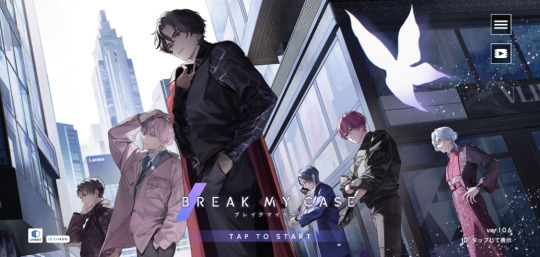
"Could you have pulled a clean version of this image from the internet so it didn't have all the game junk" no. it's my tumblr and you get my screenshots.
I (with help from friends) overviewed the initial Break My Case announcement back when it dropped. You can read that here! I said in that post that I thought a "dark rhythm game" would be a really cool direction for the game… and that's more or less what we got! GO ME!!!!!
First: the game's presentation is fantastic. Super slick graphical design and just amazing atmosphere. The sound design of this game is incredible. Genuinely. Really, really, good. All the music is amazing—I'm not knowledgeable enough to say anything other than "IT SLAPS!", but it totally does slap. The illustrations for the cards are all wonderfully atmospheric in and of themselves, and are just a delight to look at on the homescreen with its chill background music. Even just navigating menus is a sleek, seamless experience. The live2d is well-done, although it clashes a tad with the art style for a bit of an uncanny look at times.
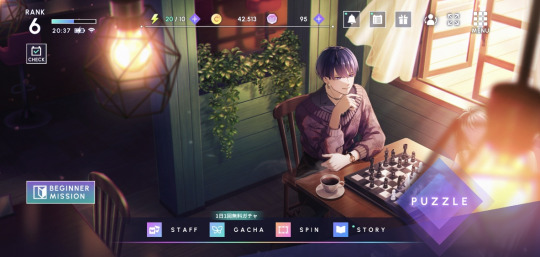
The atmosphere! The atmospheeeeeeere!!!
Of course, the draw to this game is the characters and story, so let's jump into that. I'll admit right now that I read the story through a machine translation—I have aaaalmost enough Japanese knowledge to fill in the gaps, especially since the story is fully voiced, but I'm definitely not getting the full nuance of the story that someone fluent in Japanese is going to get. THAT SAID, after completing the prologue, I was definitely intrigued enough that I want to continue slogging through the MTL just to read more! There's a great setup, centered around the bar Aporia and its three modes—a daytime cafe, a nighttime members-only bar, and, secretly, a "fixer" service who'll help anyone with any problem. Our main character, a woman who was just forced to quit her job at a corrupt company, gets hired to replace Aporia's eccentric owner while he goes on a who-knows-how-long vacation. The owner also has the role of "tail"—as in, the tail a lizard sheds to avoid being eaten. If anything in the fixer service goes wrong, it's the owner who takes the fall and the blame. This hasn't come to mean much in practice yet in the (quite short) prologue, but it's a fascinating setup. The story promises to touch on themes of the threads that weave our lives together, how small meetings can lead to massive life changes, and whether any human being is truly replaceable, even in our modern corporate world where people are treated like cogs in a machine. According to a staff interview, there are a handful of references to Stand My Heroes in BreMai, but the games' settings aren't otherwise closely linked.




Rough translation in alt text. The Aporia manager Ai may be the most mysterious, intimidating character, but he also beefs with a parrot the first time you meet him, so...
All the characters are staff at Aporia with various unique roles and background. The prologue just gives you a little bit of each of them, but everyone does show up, and they all have interesting dynamics with each other already. Ai, the stern manager, has some history with the MC that he refuses to divulge, and goes so far as to force psychologist Riku to agree to not look into it. The range of relationships among the staff run the gamut from the calm and mature friendship between fortune teller Kiho and art teacher Kyoya, to the unfaltering dedication of Yu to his ex-mafioso savior Tomose, to the ridiculous Takeru and Soyogu who spend their first appearance waking up after having gotten black-out drunk together the night before. My favorite dynamic of all so far is that of Kou and Mao—Kou is a playboy who insists he's not a playboy, and is introduced evading a woman by… asking the icy Mao to pretend to be his boyfriend so that she thinks he's taken and gay and leaves him alone. Which Mao exasperatedly agrees to, telling Kou that he's used up his allotment for this month which ohmygod how often does Kou do this. Kou if you're asking this guy to pretend to be your gay lover so often he gives you a monthly limit I think you might just have to admit you want him to actually be your gay lover, Kou, oh my god—
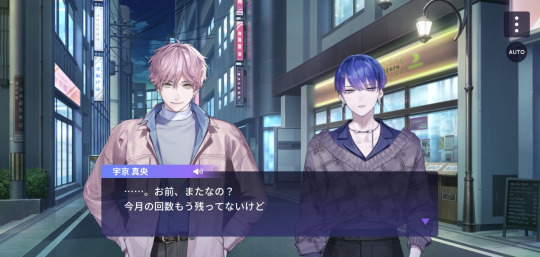
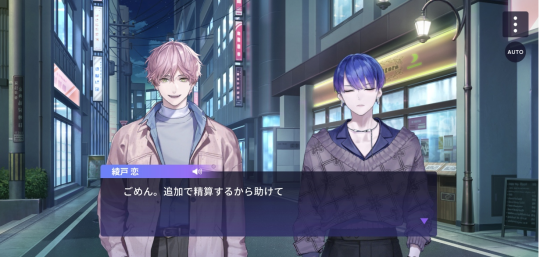
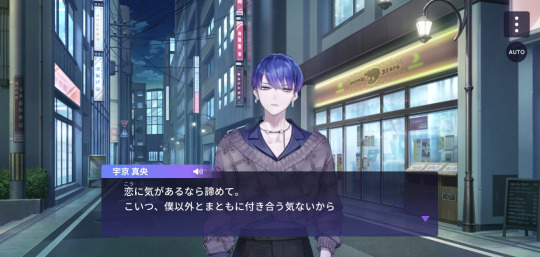
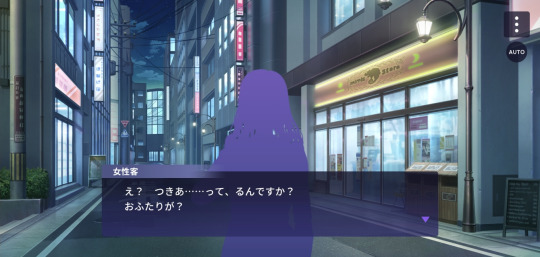
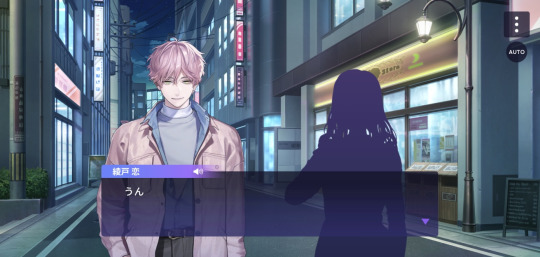
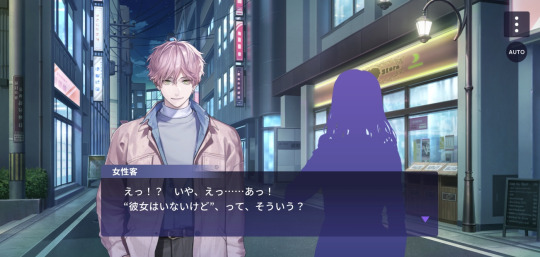
Rough TL in alt text. Kou is letting the implication do all the heavy lifting here. He technically never said he was dating Mao. Technically.
youtube
On to the gameplay. There's gameplay! Unique gameplay! Good unique gameplay! Oh my god, uncharted joseimuke territory! The main gameplay mode is a match-3 puzzle game with rhythm elements. As in other rhythm games, each song in the game is its own level, more or less. (Each character has two unique songs, and three songs shared with the other members of their unit.) You set up a team with cards you've collected from the gacha, which determine your power level and special skills. The "leader" of the team has to be the character whose level you've selected. The puzzle gameplay is a tile-swapping match 3—think bejeweled or candy crush—but the tiles you've matched are only cleared once a bar sliding across the screen hits them, clearing them in tune with the song. Everything cleared in a single swipe of the bar ups the combo counter. There's also a life system, where if the bar slides across the screen without clearing a single match, you lose a life… But the bar moves pretty slow. You're not likely to game over or even lose a single life any time soon. There are more difficult versions of the levels I've yet to unlock, so I'm sure the life meter becomes relevant then. There's also "auto" and "loop" features if you want to grind a level over and over for exp and items, but, of course, the computer can't score as high as you playing it yourself.
And, really, it's fun to play, so why would you want to!? The sound of matches clearing with the music is so satisfying and really makes you want to combo as high as possible. Once you've matched some tiles, you can't move them again, nor use them in a second match (eg, in a cross shape), so if you want to maximize your combo and make as many matches as possible with what's on the board, you have to think ahead about which matches you're going to make. The bar slowly crossing the screen adds a visual timed element that gives some urgency to putting all the matches together. It definitely feels like a game you can pick up an instinct for over time, which is super fun.
All in all, a really solid, enjoyable little puzzle game. It would be fun to play even without the promise of anime boys. Stand My Heroes is also a match-3, for the record, which is what really cements the two games as being part of the same series.
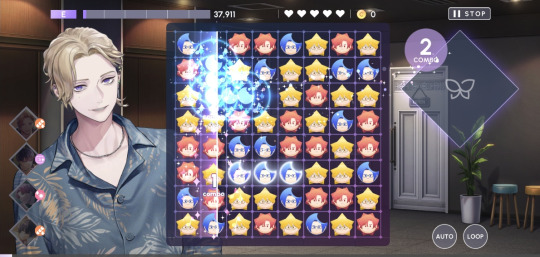
Admittedly, the anime boy staring at you while you play musical candy crush is a little disconcerting.
The second gameplay mode is "Snap'n Spin", a… gameplay-lite mode that just puts chibi characters in random strange situations and lets you take pictures of them. The mode is explained to be a video game within the world of BreMai, so it's not even trying to be realistic or relevant to anything else in the game. Once you take your pokemon snaps of the boys, they get a fun little caption. You can save up to 40 pictures in your album. Other than being cute, the main way this mode interfaces with the rest of the game is that it's the primary way to unlock card stories for the cards you pulled in gacha.
This gameplay mode is... cute? I guess? It being so disconnected from the style and aesthetics of the entire rest of the game felt weird. The chibis are adorable, so it has that going for it. And I do like some of the captions you get on the photos afterwards. My favorite were the scenes you catch of a character drinking, and then the caption reveals their current favorite drink. That's a delightful detail for a game set in a bar. Mostly, though, this mode left me wondering "why?" ...And I imagine the answer is something like "because merchandisable chibi characters are a requirement for joseimuke games." This mode could've been anything so long as these cute, starry little dudes were in it.
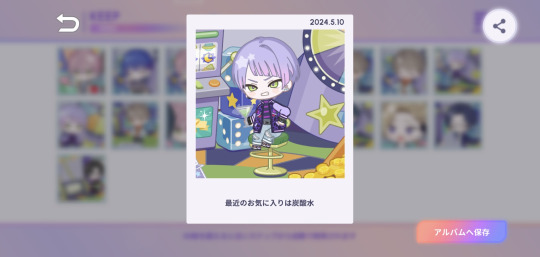
Urara here hated the drink and the caption revealed that, lately, his favorite thing is sparkling water. He's the youngest character in the cast, so I guess he hasn't grown into booze yet...
One last feature I want to mention is the jukebox. Like many games, BreMai has a music player that lets you listen to tracks from the game… But its music player is, genuinely, a fully-featured music player app with shuffle, repeat, lyric displays, and even background play that works when you're in another app or your phone is off. What! Wild! When I first learned a few days ago that BreMai had a built-in player for its BGM tracks, my first thought was "Well, what's stopping someone from downloading the game just to use the music player and never spending a cent on it? Wouldn't you rather have the songs on spotify so you at least get a pittance of ad revenue, in that case? It's more than nothing."
But having played the game now, I see what they did to prevent that, lol. You don't unlock the songs in the jukebox until you get an SS score on the song's level. Which, I mean, that's normal rhythm game stuff, of course. Can't fault that decision. But, as in other gacha rhythm games, your score in a level depends on the power of your team of cards, and the cards you get from the initial handful of pulls aren't gonna get you anywhere near an SS score without significant investment. So you're either buying in-game currency to buy upgrade items, more gacha pulls, or both. Of course, you can also put a bunch of time into grinding for upgrade items—they drop from levels. Gacha currency is harder to come by. So you're not getting songs in the player without actually playing the game lmfao. The character solo songs in particular (the ones with vocals rather than just instrumentals) also require you to build up rapport with that character—the game calls it "Nice". You build up Nice with them by playing their other songs and using their cards in levels. It takes 1000 Nice on a character to unlock their song. In my first day of playing, I was able to get one character to about 250 Nice, another to 200, and a handful more with a few points, so it builds at an okay pace. There's ways to pay to speed up the grinding for Nice and for upgrade items with things like level skip tickets. So, basically: you're not getting that music player to a useful state without investing either money or time, lmao. Is paying-or-grinding to get cool music you can listen to while not playing the game more "worth it" than the usual freemium game goals of better units, new in-game outfits, or prettier card illustrations? ...Honestly, maybe it is? It's novel, at least.
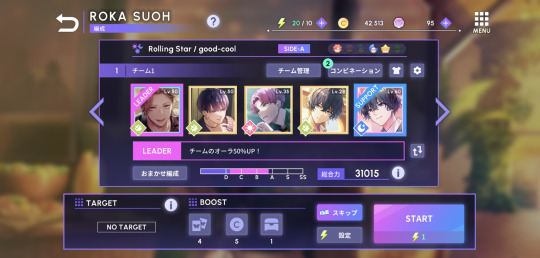
All gacha rhythm games have the same card select screen, don't they. These were my cards' levels after my first day of play, and you can see they didn't quite reach a suggested score of "A", much less the maximum "SS".
But I do want to stress, the monetization is, for the most part, pretty easy to ignore. Nothing in-your-face. The button to go to the shop screen is a different color, but it's not flashing with an eternal indicator, it's not popping up at every second, it's just sitting there alongside all the other menu buttons. The game isn't shoving timers in your face at all times—there's a stamina meter, which is mildly annoying, but you get ten plays when it's full, and if you're just playing casually you're probably not going to want to play the puzzle game over and over enough to fully deplete that. I know the bar is on the damn floor here but Tokyo Debunker seriously made me realize how bad it can be with mobile game monetization. BreMai is freemium, yeah, but as far as dark patterns go, it's not egregiously bad.
So, the verdict: if you're a joseimuke game fan and aren't afraid to play a game that probably won't get an English port and doesn't even have a fan translation yet (which I realize is already counting out 99.99% of people), definitely give this one a try. See if you like the gameplay—it really is worth trying—and do check out the story if you've got the ability. Or just look at the pretty anime boys.
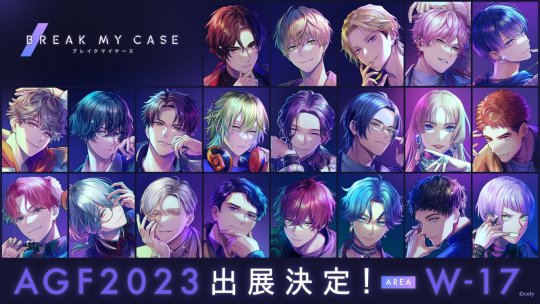
#suchobabbles#break my case#do you know how self-conscious i feel posting this. its actually so bad#so many feelings like 'did you seriously just write 2k words about a gacha game you played for a single day'#'why are you trying to pretend to be a game reviewer you have no qualifications and nobody cares about your opinions'#'stop roleplaying like youre a columnist blogger in the 2010s youre literally a tumblr nobody'#but im fighting the demons and im posting this anyways
25 notes
·
View notes